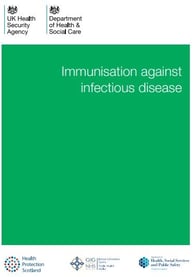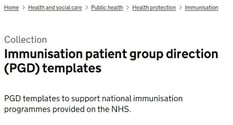Other useful links and further reading:
Hexavalent DTaP/IPV/Hib/HepB combination vaccine: information for healthcare practitioners
Diphtheria: guidance, data and analysis:
Article (Dec 2022): Why diphtheria presents a growing threat to our health | Gavi, the Vaccine Alliance.
NHS information for the public
Government data on outbreaks among asylum seekers in England in 2022.
Recent Updates & News
5th June 2025: Green Book chapter update for Diphtheria. PGD template updates also arrived; for the Hexavalent vaccine DTaP/IPV/Hib/HepB.
2nd June 2025: This guidance got an update: "Hexavalent DTaP/IPV/Hib/HepB combination vaccine: information for healthcare practitioners". As did this page (Hexavalent combination vaccine: programme guidance) in general.
29th May 2025: More resources - an updated slideset for the hexavalent programme. Will help with understanding the upcoming changes in the programme from July 2025.
24th April 2025: Diphtheria annual reports published. From January to December 2024, 12 UK cases, no deaths. Thankfully, there were no cases among asylum seekers with recent arrival in England, compared with 13 cases in 2023 and 72 cases in 2022. Diphtheria is very rare in England due to the success of the immunisation programme introduced in 1942, when the average annual number of cases was about 60,000 with 4,000 deaths. Over the past decade, the number of diphtheria cases in England has increased from an average of 2 to more than 10 cases per year (with the exception of 2020).
30th March 2025: 10 diphtheria cases reported in Lagos
23rd Jan 2025: The School leaver booster (Td/IPV): vaccine coverage estimates are out. It made me quite sad looking at the uptake data, I have to admit. Td/IPV coverage for year 10 students during the 2023/24 was 72.7%, which is 6.8 percentage points lower than the year 10 cohort in 2022/23.
22nd Jan 2025: The routine imms schedule has been updated to reflect a change to the use of REPEVAX rather than Boostrix-IPV at 3 years and 4 months.
AUGUST 2024: Lab reports updated. Summary: from January to December 2023: From January to December 2023, toxigenic corynebacteria were isolated from 27 human individuals in England. Of these 27, 16 were Corynebacterium diphtheriae cases (including 13 among asylum seekers with recent arrival in England and 3 travel-acquired cases) and 11 were C. ulcerans cases. There were zero deaths. Of the 13 C. diphtheriae cases among asylum seekers, 6 had cutaneous symptoms, 3 had mild respiratory symptoms and 3 had both cutaneous and respiratory symptoms (the remaining one case was a respiratory carrier). All of the 3 travel-acquired cases of toxigenic C. diphtheriae cases presented with cutaneous symptoms. 9 of the 11 toxigenic C. ulcerans cases presented with cutaneous symptoms (one case had an infected joint bursa while the remaining case presented with a rash and fatigue). There were no non-toxigenic tox gene-bearing (NTTB) cases, compared to one last year. There were no cases presenting with classical respiratory diphtheria.
JULY 2024 Updated Td/IPV PGD 10th July.
FEB 2024 Diphtheria: WHO publishes guidance following outbreaks
NOV 2023 GOV.UK published supplementary outbreak guidance
NOV 2022 Outbreaks reported in asylum seekers in Manston, Kent.
Bits and bobs to casually drop into conversation
Did you know....
Diphtheria is rare in the UK because kids have been routinely vaccinated against it since the 1940s. In 1940, more than 61,000 cases with 3,283 deaths were notified in the UK, compared with 38 cases and six deaths by 1957
For unvaccinated individuals, without proper treatment, diphtheria can be fatal in around 30% of cases, with young children at higher risk of dying (WHO).
Recent diphtheria outbreaks (see articles in recommended reading above) show the importance of sustaining high levels of vaccination coverage in communities.
There is little likelihood of developing natural immunity from sub-clinical infection acquired in the UK. Based on sero-surveillance studies, approximately 50% of UK adults over 30 years are susceptible to diphtheria. The proportion susceptible increases to over 70% in older age cohorts (Green Book, Ch 15)
Up to the early 1990’s it was possible to have separate Tetanus, Diphtheria and Polio vaccines. However a major epidemic in Russia led to many deaths and following that the WHO mandated that all Tetanus vaccines had to also contain cover for Diphtheria.














